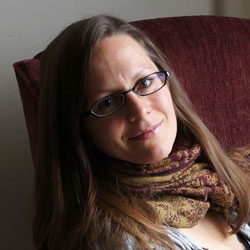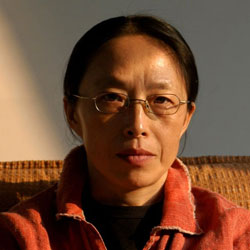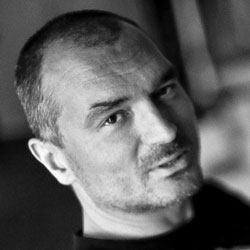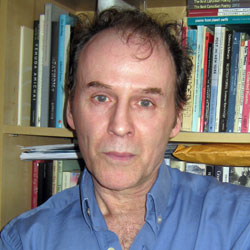Announcing
The Griffin Poetry Prize 2015 Shortlist
TORONTO – April 7, 2015 – Scott Griffin, founder of The Griffin Trust For Excellence In Poetry is pleased to announce the International and Canadian shortlist for this year’s prize. Judges Tim Bowling (Canada), Fanny Howe (USA) and Piotr Sommer (Poland) each read 560 books of poetry, from 42 countries, including 24 translations.
The seven finalists—four International and three Canadian—will be invited to read in Toronto at Koerner Hall at The Royal Conservatory in the TELUS Centre for Performance and Learning, 273 Bloor Street West, Toronto, on Wednesday, June 3rd at 7.30 p.m. The seven finalists will each be awarded $10,000 for their participation in the Shortlist Readings.
The winners, to be announced at the Griffin Poetry Prize Awards on Thursday, June 4th, will each be awarded $65,000.
Download the 2015 Griffin Poetry Prize shortlist press release, book and publisher details, poet biographies and judges' citations.
DownloadInternational Shortlist


book Something Crosses My Mind
translator Eleanor Goodman
poet Wang Xiaoni
publisher Zephyr Press
Biographies
Eleanor Goodman is a writer and translator. She is a Research Associate at the Fairbank Center at Harvard University and spent a year at Peking University on a Fulbright Fellowship. Her book of translations, Something Crosses My Mind, by Wang Xiaoni was the recipient of a 2013 PEN/Heim Translation Grant. Goodman has been an artist in residence at the American Academy in Rome, was awarded a Henry Luce Translation Fellowship from the Vermont Studio Center and received the International Merit Award in Poetry from the Atlanta Review. Her work appears in publications such as PN Review, The Quarterly Conversation, Fiction, Pathlight, Cha, The Guardian, Pleiades, Acumen, Perihelion, The Los Angeles Review and on The Best American Poetry web site.
Wang Xiaoni was born in Changchun, Jilin, near the border with North Korea, in 1955 and spent seven years as a laborer in the countryside during the Cultural Revolution. In 1977 she was accepted into the Chinese Department at Jilin University and in 1985 she moved to Shenzhen, in southern China. She is one of the few women associated with the "Misty" poets, though her poetry tends to focus on what she calls "the complex state of the human psyche" and avoids the overtly political. Wang has worked as a film script editor and college professor. Her publications include more than twenty five books of poetry, essays and novels.
Judges' Citation
"What is so attractive about Wang Xiaoni's poems as translated into English by Eleanor Goodman is her quiet, loving, meditative distance to the mostly anonymous and lonely heroes she clearly knows well. And her attitude to time, which she keeps dragging out of its anchored localities (and barely marked history) to extend and connect, or fuse with specific spaces that she also enlarges in size and scope. Moments prolong into a century or a life, imaginary beasts meld with real animals, description becomes an act of meditation. In a few lines, a village can take on the dimension of a vast landscape - and yet still remain that particular village. And while Xiaoni's characters may not speak, they seem to have a real insight into our experience and lives. In a way nothing much happens in her magic lyricism: the wind blows, the ocean rises, people work or move from one place to another, or wait, or just leave some place, and they have souls (which behave like shadows); someone on a journey sees them, through the window, between one landscape and another, and it's difficult to know why all this is so moving. Reading her, I found myself repeating Auden's phrase "About suffering they were never wrong, / The old Masters." Wang Xiaoni is a terrific contemporary poet gracefully extending the great classical Chinese tradition."
Summary
Something Crosses My Mind spans twenty years of Wang Xiaoni's poetry and is her first book to appear in English. It is part of the "Jintian Series" of books of contemporary Chinese poets, published by Zephyr Press in conjunction with the Jintian Foundation of Hong Kong and the Chinese University Press.
More about Eleanor Goodman and Wang Xiaoni
The following are links to other Web sites with information about translator Eleanor Goodman and poet Wang Xiaoni. (Note: All links to external Web sites open in a new browser window.)
- Eleanor Goodman, writer & translator
- Interview with Eleanor Goodman, translator from Chinese (Poetry International)
- Poetry Night In Beijing: A Conversation With Eleanor Goodman
- Profile of Wang Xiaoni (Poetry International)
- Poetry review: Something Crosses My Mind, by Wang Xiaoni (South China Morning Post)
- On Translating Wang Xiaoni (PEN America)
Note: Summaries are taken from promotional materials supplied by the publisher, unless otherwise noted.
November's Rice-Gleaners
From Guangxi to Jiangxi I glimpse rice-gleaners bent to the ground.
In province after province the vegetation yellows in province after province this country was once willing to pave the ground with gold.
Still there are always people at dusk looking like bent black nails. Who will come to admire the ancient sorcery of rice-gleaners turning a bit of gold into a grain of rice.
Don't be like me hurrying along on the train as though there's urgent business crossing three provinces in a single day occasionally noting the earth is still adorned with rice-gleaners.
I want to call for them to stand up to see the faces worth the least gold to see the color of sweat they produce.
From Something Crosses My Mind by Eleanor Goodman translating from Chinese by Wang Xiaoni
Copyright © Eleanor Goodman 2014


book Finite Formulae & Theories of Chance
translator Marek Kazmierski
poet Wioletta Greg
publisher Arc Publications
Biographies
Marek Kazmierski is a writer, publisher and translator. He escaped communist Poland as a child and settled in the UK. Joint winner of the Decibel Penguin Prize and sole recipient of the BIKE Magazine Philosopher of the Year award, Marek is also the managing editor of a prison literary magazine Not Shut Up and founder of OFF_PRESS, an independent publishing house which has worked with English PEN, the South Bank Centre, the Polish Cultural Institute, the Mayor of London and various universities across Europe. His work has been published in numerous journals and titles, including The Guardian, 3AM Magazine and Poetry Wales. This book was translated during his residency at Villa Decius in Krakow, Poland, courtesy of The Polish Book Institute.
Wioletta Greg is a poet, writer, editor and translator. Born in southern Poland, she moved to the UK in 2006 and currently resides in the town of Ryde on the Isle of Wight. Wioletta has published several volumes of poetry in Poland, Canada and the UK, including Wyobraznia kontrolowana (Controlled Imagination, 1988); Parantele (Kinships, 2003); Orinoko (2008); Inne obroty (Alternate Turns, 2010); the bilingual Pamiec Smieny/Smena's Memory (2011); the collection of short prose forms Notatnik z wyspy (Notes from an Island, 2011) and a debut novel, Guguly (2014) in which she revisits the experience of growing up in communist Poland. Her poems have appeared in numerous literary journals and she has won several literary prizes, including the Tyska Zima Poetycka.
Judges' Citation
"These poems, as translated from Polish into English by Marek Kazmierski, retain the force of first experience and, equally, a collection of history's remains. Greg's thoughts include the catastrophe of the 20th century whose marks still wobble before her eyes, and into the experience of living in post-Communist Poland. This stunning collection shows us (mostly through the eyes and memories of childhood) a world of objects transported across years. 'Tossing satin bulbs into wicker baskets,' the child poet is at ease with the earth and the hardy objects made from it. Greg grants us the privilege of seeing what she saw before she saw more."
Summary
One hundred years since the outbreak of the First World War, the Polish poet Wioletta Greg undertakes a literary journey through her own family history, exploring in both poetry and prose a century of life, death, love and tragedy. With passion, tenderness and humour, she traces a path from the lives of her grandparents in early twentieth-century Poland, through two world wars, life under Communism and the subsequent liberation, to her own experiences as a migrant living in Britain on the Isle of Wight. Wioletta Greg's new collection, in Marek Kazmierski's attentive and nuanced translation, serves as both a moving personal testament to a family that survived, and a compelling document of a century of European history.
More about Marek Kazmierski and Wioletta Greg
The following are links to other Web sites with information about translator Marek Kazmierski and poet Wioletta Greg. (Note: All links to external Web sites open in a new browser window.)- Marek Kazmierski: Tuwim with a Hashtag ñ Interview (Culture.pl)
- Interview: Marek Kazmierski, Managing Editor ñ Not Shut Up
- A review of Wioletta Gregís Finite Formulae and Theories of Chance (Arc Publications, 2014) (Oxford Brookes Poetry Centre)
- Pamiec Smieny - Wioletta Grzegorzewska (in Polish)
- Women Online Writing - Wioletta Greg (Wioletta Grzegorzewska)
- Wioletta Grzegorzewska (literackie.pl)
Note: Summaries are taken from promotional materials supplied by the publisher, unless otherwise noted.
Spring, 1986
The night was heavy, but the air was alive. Mike Oldfield
At night, the Chernobyl cloud fell across pastures. Thyroids swelled. The pond glowed with murmuring iodine, swallows kissing crooked mirrors.
The radio kept playing "Moonlight Shadow". In the barn, a girl guide from the city started a club for virgins. Smoking menthols, we took lessons in preparing for conjugal life from copies of Playboy instead.
There would be no other end to the world, and yet it kept coming, like cramps and acne, until I discovered spots of dark blood in my underwear.
From Finite Formulae & Theories of Chance by Marek Kazmierski translating from Polish by Wioletta Greg Copyright © Marek Kazmierski 2014

book The Stairwell
poet Michael Longley
publisher Jonathan Cape
Biography
Michael Longley was born in Belfast in 1939. He has published nine collections of poetry including Gorse Fires (1991) which won the Whitbread Poetry Award, and The Weather in Japan (2000) which won the Hawthornden Prize, the T.S. Eliot Prize and the Irish Times Poetry Prize. In 2001 he received the Queen's Gold Medal for Poetry and in 2003 the Wilfred Owen Award. He was awarded a CBE in 2010 and was Ireland Professor of Poetry, 2007-2010.
Judges' Citation
"Part of the excitement and pleasure of Michael Longley's The Stairwell comes from the quiet unpredictability of what his language does. It is modest and unassuming, yet bold in its deceptively small meditations. His sentences achieve their goals through sophisticatedly simple means: Longley loves to understate (or underplay), retard (and see how far he can go), imply, question, and enumerate (long enumeration in short poems is part of his signature). This book, including the elegy sequence that comprises the whole second section, is a masterly realization of the light touch he brings to serious subjects, as if sentences were his way of breathing. And they do not behave conventionally, despite his life-long study of such basic things as love, friendship, death, experience, memory, historical memory included, and of some other disciplines that go along with them, like learning to know nature for instance. There's also a lot to learn from Michael Longley - part of the pleasure is the detailed knowledge and wisdom the poems bring. While greatly attached to certain classical rules, Longley has always paid homage to them so interestingly, simultaneously mastering and subverting them. The Stairwell is a book by a major poet writing at the height of his powers."
Summary
The psychologically suggestive word 'stairwell' is in itself ambiguous. In his tenth collection of poems Michael Longley writes of birth as well as death, childhood and age, nature and art, the animal and human worlds, tenderness and violence, battlefield and 'homeland'. Longley has built this collection on intricate doublings; the second part of the book is a powerful sequence of elegies for his twin brother, Peter, and elsewhere the dominant mood is elegiac.
Note: Summaries are taken from promotional materials supplied by the publisher, unless otherwise noted.
More about Michael Longley
The following are links to other Web sites with information about poet Michael Longley. (Note: All links to external Web sites open in a new browser window.)
Boat
for Seamus
What's the Greek for boat, You ask, old friend, Fellow voyager Approaching Ithaca - Oh, flatulent sails, Wave-winnowing oars, Shingle-scrunching keel - But, so close to home, There's a danger always Of amnesiac storms, Waterlogged words.
From The Stairwell by Michael Longley
Copyright © Michael Longley 2014

book The Road to Emmaus
poet Spencer Reece
publisher Farrar, Straus and Giroux
Biography
Spencer Reece is a poet and priest; his first collection, The Clerk's Tale, won the Bakeless Prize in 2003. He has received an NEA grant, a Guggenheim grant, the Witter Bynner Prize from the Library Congress, a Whiting Writers' Award and the Amy Lowell Traveling Scholarship. His poems have been published in the New Yorker, Poetry, The American Scholar and The New Republic. He served at the Honduran orphanage, Our Little Roses, and as the chaplain to the Bishop of Spain for the Reformed Episcopal Church, Iglesia Español Reformada Episcopal. Currently he is completing a book of prose, The Little Entrance, about his decision to become a priest in middle age.
Judges' Citation
"This is an open book, a welcoming one like a voice on the phone we instantly remember. Maybe Frank O'Hara has returned? Maybe the Berrigans, including Ted? What happiness to hear that good-natured tone again! Spencer Reece has slipped in among us, without any forewarning or embarrassment, his poems like faces turning to call us to follow them. Who is he? Let's go. Whether he knew it or not, the experience of reading his poems is similar to the recognition moment on the road to Emmaus. We are glad to trust so completely. In these poems we also meet a kind of 'innocent American' in the best, almost lost sense."
Summary
Reece's central figure in The Road to Emmaus is a middle-aged man who becomes a priest in the Episcopal Church; these poems follow him to New York City, to Honduras, to a hospital where he works as a chaplain, to a prison, to an Alcoholics Anonymous meeting. A yearning for connection, an ache of loneliness and the instant of love disappearing before our eyes haunt this long-awaited second collection from Spencer Reece.
More about Spencer Reece
The following are links to other Web sites with information about poet Spencer Reece. (Note: All links to external Web sites open in a new browser window.)- Spencer Reece (Poetry Foundation)
- Questions of Faith: Spencer Reece (Poetry Society of America)
- Post-40 Bloomer: Spencer Reece, The Poet's Tale (The Millions)
Note: Summaries are taken from promotional materials supplied by the publisher, unless otherwise noted.
The Fifth Commandment
Waiting with an unfinished, finished look behind honeysuckles that crown Old Saybrook, she is reading Vita Sackville-West, he has food on his moth-eaten sweater vest. Here's the Oriental rug, still steeped in piss from their bulldog who barked like an activist. She seems happy, reigning with creams you FedExed, rubbing his scalp, patched with scabby flecks (as his squamous-cell carcinomas sprout, the local dermatologist cuts them out or frosts the growths with liquid nitrogen). Tonight they talk of their last vegetable garden, count out their pills in chipped cereal bowls (you know the ones), check their sugar levels, bicker over books misplaced, tchotchkes lost, their tongues like well-used church keys. Brother, last night half the garden nearly froze. The dash between their dates is nearly closed.
From The Road to Emmaus by Spencer Reece
Copyright © Spencer Reece 2014
Canadian Shortlist

bookCongotronic
poetShane Book
publisherHouse of Anansi Press
Biography
Shane Book is an award-winning poet and filmmaker. He was educated at the University of Victoria, the Iowa Writers' Workshop and Stanford University where he was a Wallace Stegner Fellow. His writing has appeared in more than twenty anthologies, including The Great Black North: Contemporary African Canadian Poetry.
Judges' Citation
"Here is a contemporary world music that whirls the reader into the centre of the action at once. Here is a spread of thoughts with a winning beat, a door held open to varieties of sound and content from multiple cultures. In these beautifully adept pages, English as we know it is not the only language we are reading but a spread of voices receptive to webs and forms from everywhere else. It's a new poetics but also wholly recognizable in its content. An outcry written to be heard while reading: this poetry signals a breakthrough necessary, innovative and emotionally piercing."
Summary
Congotronic is the second collection from Canadian poet and filmmaker Shane Book. At once original, strange, funny and unnerving, Congotronic takes the reader into unstable territory, where multiple layers of voice, diction and music collide. Some of these poems have the sparse directness of a kind of bleak prayer; others mingle the earthbound rhythms of hip-hop with the will-to-transcendence of high Romanticism.
Note: Summaries are taken from promotional materials supplied by the publisher, unless otherwise noted.
More about Shane Book
The following are links to other Web sites with information about poet Shane Book. (Note: All links to external Web sites open in a new browser window.)
The Rumpus Poetry Book Club interviews Shane Book
Shane Book, selected by Thomas Sayers Ellis - Introduction to the work of Shane Book
Q&A with Shane Book (Please Excuse This Poem)
World Town
Entirely windless, today's sea; of these waters' many names the best seemed "field-of-pearl-leaves," for it smelled like the air in the house he built entirely of doors: pink school door, gold of the burnt hotel, two old church blues, the abandoned bank's steel doors singular and immovably wedged over the family's heads though as with everything corroding the sense of themselves slipping away in the heat, falling through the day's brightness the way soldiers once fell upon him walking home with a bucket of natural water as he had been recalling the town square before the tannery's closing: he and his father shopping on horseback in the noon Praça where they first saw a man crouched under a black shroud, what his father called a camera. His father forgot the incident immediately, but for years the man asked whomever if they remembered a camera, vegetable stalls, the butcher holder the cleaver, a horseshoeing shop, purple berries, the long cassava valley haze, fishnets, a few crab baskets and browning nets drying by the ice cream shop, seven taverns, a small, unused ferry terminal, a map on its wall outlining the island in blue, the names Good Dispatch, Lover's Bridge pointed to by a mermaid of skin whiter than anyone on this island of Angola's descendants, her red hair.
From Congotronic by Shane Book
Copyright © Shane Book 2014

bookBlue Sonoma
poetJane Munro
publisherBrick Books
Biography
Jane Munro is the author of five previous books of poetry, most recently Active Pass (2010) and Point No Point (2006). Her work has received the Bliss Carman Poetry Award, the Macmillan Prize for Poetry and been nominated for the Pat Lowther Award. She is a member of Yoko's Dogs (Jan Conn, Mary di Michele, Susan Gillis, Jane Munro), a poetry collective whose first book Whisk was published in 2013. After living for twenty years on the southwest coast of Vancouver Island, she has now returned to Vancouver.
Judges' Citation
"Somewhere between the directness and clarity of haiku and Yeats's 'An aged man is but a paltry thing' moves Jane Munro's hauntingly candid explorations of the hard truths of growing old. But Blue Sonoma unflinching as its poems are in their wrestling with a partner's Alzheimer's, with memory, death, and dying, and with the inexorable advance of time, achieves an engaging liveliness as a result of the poet's earthy voice, colloquial wit, and acute descriptive powers. For Munro, language, travel, and art are the 'props/in a little, local theatre of light', and this theatre's relationship to other worlds, other possible states of consciousness, repeatedly leavens Blue Sonoma's painful content with wisdom and delicacy. In primarily short lines of impressive transparency, Munro's writing, replete with natural images of Canada's west coast, celebrates, even as it confronts with blunt honesty, the sensuous passage through the years towards whatever transition must follow. 'And us, were we substance or reflection?' The question hovers over this gathering of deeply meditative and viscerally felt poems and leads us, with gentleness but no apology, into the realm of riveting and ultimate contemplation."
Summary
In Blue Sonoma, award-winning poet Jane Munro draws on her well-honed talents to address what T.S. Eliot called "the gifts reserved for age". A beloved partner's crossing into Alzheimer's is at the heart of this book and his "battered blue Sonoma" is an evocation of numerous other crossings: between empirical reportage and meditative apprehension, dreaming and wakefulness, Eastern and Western poetic traditions. Rich in both pathos and sharp shards of insight, Munro's wisdom here is deeply embedded, shot through with moments of wit and candour. In the tradition of Taoist poets like Wang Wei and Po-Chu-i, her sixth and best book opens a wide poetic space and renders difficult conditions with the lightest of touches.
More about Jane Munro
The following are links to other Web sites with information about poet Jane Munro. (Note: All links to external Web sites open in a new browser window.)
- Jane Munro official web site
- An Interview with Jane Munro (CWILA - Canadian Women in the Literary Arts)
- Jane Munro poems and Q&A (Canadian Literature Quarterly)
Note: Summaries are taken from promotional materials supplied by the publisher, unless otherwise noted.
Sonoma
He totalled his blue truck - slowly spun out on an icy bridge, rammed it into a guard rail.
Climbed out unbruised. Coal Creek. Middle of nowhere. A passing couple brought him home.
Then three years with letters from the Motor Vehicle Department before he relinquished his license.
Before we met, while driving cab, he broke his neck. It rewelded off-kilter: head stuck forward.
Six years later, it's that jut I suddenly see ahead. It's late, but for once no mist or fog. And on all the twists and turns of that coastal highway,
its bluffs and coves, I am following the spitting image of him in that battered Sonoma -
its peeling paint, cracked brake lens, the slumped driver silhouetted by my lights - only the two of us on the road.
From Blue Sonoma by Jane Munro
Copyright © Jane Munro 2014

bookThe Hundred Lives
poetRussell Thornton
publisherQuattro Books
Biography
Russell Thornton has published five previous books of poetry, with House Built of Rain being shortlisted for the BC Book Prize and the ReLit Poetry Award and Birds, Metals, Stones & Rain shortlisted for the 2013 Governor General's Award. Thornton won the League of Canadian Poets National Contest in 2000 and The Fiddlehead magazine's Ralph Gustafson Prize in 2009. He lives in North Vancouver.
Judges' Citation
"The poems in The Hundred Lives burn with a rare blend of rhythmic intensity and hard-earned experience that make them at once timeless and contemporary; on page after page, in line after line, we hear the ancient, communal music of language sung through a consciousness of maturity, loss, and restless spiritual hunger. In a very real sense, Thornton's lyric narratives and dialogues - of travel, of Lazarus and the Song of Songs, of romantic love - dramatically enact Robert Frost's notion that the greatest of all attempts is 'to say matter in terms of spirit, or spirit in terms of matter, to make the final unity'. Thornton speaks with utter conviction and credibility to forge a personal vision, a 'pathway through the apple', to an always-richer understanding of human experience. Whether the poems take us to Greece, where gypsy women move 'like living tarot in the street', or to the memory of a beloved grandmother 'out in the sailing ship of her wedding dress. Her ashes', always The Hundred Lives puts us in intimate touch with 'first fire, first waters', with the tenderness and pain of vital engagement."
Summary
In The Hundred Lives Russell Thornton illuminates the intricate imaginative orders of love at work within an individual life. From poems set in the eastern Mediterranean, with its abiding reverberations of the ancient Greek world, to a series of sonnet responses to the Gospel story of Lazarus, a lyric narrative engagement with the mythic-erotic drama of the Biblical Song of Songs, to intensely personal poems that explore love and loss, this collection highlights the mystery of the interplay between inner and outer energies at the core of human experience.
More about Russell Thornton
The following are links to other Web sites with information about poet Russell Thornton. (Note: All links to external Web sites open in a new browser window.)- Russell Thornton blog
- Any Semblance of Departure Will Be a Continuation: An Interview with Russell Thornton (Event Magazine)
- Russell Thornton poems and Q&A (Canadian Literature Quarterly)
Note: Summaries are taken from promotional materials supplied by the publisher, unless otherwise noted.
Sappho's Moon
Eros, weaver of tales - Sappho
A woman who is you and not you is standing naked by the window, the burden of her desire on her, and the anonymous touch of the moon, its soft dazzle that is the story of light. And she is asking that her desire be woven into the story, that she be released from her body through her body and the moon's touch. It is a night she knows she must wait as if she has always waited in front of a moon of waiting, and the light made of distance that brings the world to the world, and the light made of her asking to live in her life, that remains as her desire grows outward and twines with sorrow, and remains. It is the light Sappho saw and felt journeying through her, shining now in the flesh of one who is standing by a window, and whose name I will not know when I awake again beside her. It is the story hidden in the flesh that will tell us of the light that shines from every form in its elsewhere beyond desire, but here must be woven together, and her desire weave her a garment of a subtle, endless cloth that will wrap itself around her and become her nakedness, weaving a garment for the moon.
From The Hundred Lives by Russell Thornton
Copyright © Russell Thornton 2014
Each year, The Griffin Trust For Excellence In Poetry presents an anthology of poems selected from the shortlisted books, published by House of Anansi Press. Royalties from The Griffin Poetry Prize Anthology are donated to UNESCO’s World Poetry Day.
Tickets for the Shortlist Readings to be held on Wednesday, June 3rd, at Koerner Hall at The Royal Conservatory in the TELUS Centre for Performance and Learning, 273 Bloor Street West, Toronto are available at http://performance.rcmusic.ca/event/2015-griffin-poetry-prize-shortlist-readings or by calling (416) 408-0208.
NOTE: The publishers mentioned in our release are those who submitted the books.
Note to Booksellers: Griffin Poetry Prize book stickers are supplied free of charge by The Griffin Trust. Please contact info@griffinpoetryprize.com to place an order. Winner book stickers will be available after June 4th.
Media Inquiries:
Melissa Shirley
Tel: (647) 389-9510
Email: publicity@griffinpoetryprize.com
General Inquiries:
Ruth Smith, Manager
Tel: (905) 618-0420
Email: info@griffinpoetryprize.com
Links
| Shortlisted Publishers’ Web sites: | |
|---|---|
| Arc Publications: | www.arcpublications.co.uk |
| Brick Books: | www.brickbooks.ca |
| Farrar, Straus and Giroux: | www.fsgbooks.com |
| House of Anansi Press: | www.houseofanansi.com |
| Jonathan Cape: | www.Randomhouse.co.uk |
| Quattro Books: | www.quattrobooks.ca |
| Zephyr Press: | www.zephyrpress.org |
Downloadable photographs of the 2015 shortlisted poets:
http://www.griffinpoetryprize.com/news-and-events/media-resources/
Download the 2015 Griffin Poetry Prize shortlist press release, book and publisher details, poet biographies and judges' citations.
Download
Get your tickets for the 2015 Griffin Poetry Prize readings at Koerner Hall. Call (416) 408-0208 or
click here to purchase them online.